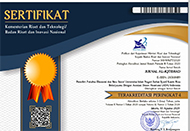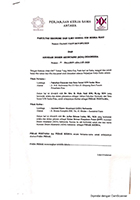CULTURE OF “DELO TOMBOWA LO TABO WAU LABIYA” IN CAPITAL ACCOUNTING PRACTICES BY ILABULO TRADERS
Abstract
Keywords
Full Text:
PDFReferences
Accounting Association. Committee to Prepare a Statement of Basic Accounting Theory American. (1966). A Statement of Basic Accounting Theory. Amerika Serikat.
Adam, N., & Xyzquolyna, D. (2020). Substitusi Tepung Kacang Hijau (Phaseolus radiatus L.) pada Pembuatan Makanan Tradisional Gorontalo Ilabulo. Gorontalo Agriculture Technology Journal, 3(1), 13–22. https://doi.org/10.32662/gatj.v3i1.958
Agustuliani, A., & Majid, J. (2016). Implementasi Nilai Itsar Membangun Konsep Harga Jual pada Pasar Pannampu Makassar. Jurnal Ilmiah Akuntansi Peradaban, 2(1). https://doi.org/10.24252/jiap.v2i1.2996
American Institute of Accountants. (1940). Reports of Committee on Terminology. Committee on Accounting Procedure. Amerika Serikat.
Anwar, F., Amaliah, T. H., & Noholo, S. (2015). Internalisasi Nilai-Nilai Budaya Gorontalo “Rukuno Lo Taaliya” Dalam Penetapan Harga Jual Pada Pedagang Tradisional Di Kota Gorontalo. Jurnal Akuntansi & Auditing, 12(2), 89–109. https://doi.org/10.14710/jaa.12.2.110-122
Arena, T., Herawati, N., & Setiawan, A. R. (2017). “ Akuntansi Luar Kepala ” dan “ Sederhana ” ala UMKM Batik Tanjung Bumi yang Sarat Nilai Religiusitas dan Kesalingpercayaan (Sebuah Studi Etnografis). Jurnal Infestasi, 13(2), 309–320. https://doi.org/10.21107/infestasi.v13i2.3510
Baruadi, K., & Eraku, S. (2018). Lenggota Lo Pohutu (Upacara Adat Perkawinan Gorontalo) (T. Paedasoi, Ed.). Gorontalo: Ideas Publishing.
Briando, B., Triyuwono, I., & Irianto, G. (2017). Gurindam Etika Pengelola Keuangan Negara. Jurnal Akuntansi Multiparadigma, (2001). https://doi.org/10.18202/jamal.2017.04.7036
Burchell, S., Clubb, C. & Hopwood, A. G. (1985). Accounting in Its Social Context: Towards a History of Value Added in UK. Accounting, Organizations and Society., 10(4), 381–413. https://doi.org/10.1016/0361-3682(85)90002-9
Cooper, C., Neu, D., & Lehman, G. (2003). Globalisation and its Discontents: A Concern about Growth and Globalization. Accounting Forum, 27(4), 359–364. https://doi.org/10.1046/j.1467-6303.2003.00110.x
Daulima, F. (2009). Lumadu (Ungkapan) Sastra Lisan Daerah Gorontalo. Gorontalo: Galeri Budaya Daerah Mbu’i Bungale.
Garfinkel, H. (1967). Studies in Ethnomethodology. Prentice Hall: New Jersey.
Harmain, R. M. (2014). Analisis Asam Lemak tak Jenuh Omega-3 dan Omega-6 pada Produk ilabulo Ikan Patin (Pangasius sp.) Sebagai Pangan Fungsional. Penelitian Dasar Keilmuan, 1(917). Retrieved from https://repository.ung.ac.id/en/riset/show/1/917/analisis-asam-lemak-tak-jenuh-omega-3-dan-omega-6-pada-produk-ilabulo-ikan-patin-pangasius-sp-sebagai-pangan-fungsional.html
Hofstede, G. H. (1986). The Cultural Context of Accounting. Accounting and Culture: Plenary Session Papers and Discussants’ Comments from the 1986 Annual Meeting of the American Accounting Association, 1–11.
Kamayanti, A. (2011). Akuntansiasi atau Akuntansiana Memaknai Reformasi Akuntansi Sektor Publik di Indonesia. Jurnal Akuntansi Multiparadigma, 2(3), 369–540. http://dx.doi.org/10.18202/jamal.2011.12.7138
Kamayanti, A. (2015). Paradigma Penelitian Kualitatif dalam Riset Akuntansi: Dari Iman Menuju Praktik. Infestasi, 11(1), 1–10. https://doi.org/doi.org/10.21107/infestasi.v11i1.1119
Kamayanti, A. (2016a). Fobi(a)kuntansi: Puisisasi dan Refleksi Hakikat. Jurnal Akuntansi Multiparadigma, 7, 1–16. https://doi.org/10.18202/jamal.2016.04.7001
Kamayanti, A. (2016b). Integrasi Pancasila Dalam Pendidikan Akuntansi Melalui Pendekatan Dialogis. Journal of Accounting and Business Education, 2(2), 1–16. https://doi.org/10.26675/jabe.v2i2.6063
Kamayanti, A. (2017). Akuntan ( Si ) Pitung: Mendobrak Mitos Abnormalitas dan Rasialisme Praktik Akuntansi. Jurnal Ris, 3(2), 171–180. https://doi.org/10.18382/jraam.v2i3.176
Kamayanti, A. (2018). Islamic (accounting) ethics education: Learning from shalat. Imanensi: Jurnal Ekonomi, Manajemen, Dan Akuntansi Islam, 3(1), 1–9. https://doi.org/10.34202/imanensi.3.1.2018.1-9
Kamayanti, A. (2020). Metodologi Penelitian Kualitatif Akuntansi: Pengantar Religiositas Keilmuan (Edisi Revisi). Penerbit Peneleh.
Kamayanti, A., & Ahmar, N. (2019). Tracing Accounting in Javanese Tradition. International Journal of Religious and Cultural Studies, 1(1), 17–26. https://doi.org/10.34199/ijracs.2019.4.003
Ludigdo, U., & Kamayanti, A. (2012). Pancasila as Accountant Ethics Imperialism Liberator. World Journal of Social Sciences, 2(6), 159–168.
Mardiasmo. (2002). Akuntansi Sektor Publik. Yogyakarta: Penerbit Andi.
Nadirah, S. (2019). Analisa Kandungan Lemak, Protein dan Organoleptik Ilabulo Hati dan Ampela Ayam. Gorontalo Agriculture Technology Journal, 2(1), 1–9. https://doi.org/10.32662/gatj.v2i1.546
Nupulo, N., Kalele, J. a. D., Sembor, S. M., & Lontaan, N. N. (2020). Kualitas Ilabulo Menggunakan Tepung Sagu dengan Level yang Berbeda. ZOOTEC, 40(2), 626–635. https://doi.org/10.35792/zot.40.2.2020.29741
Poliyama, P., Wahyuni, I., Sondakh, E. H. B., & Ratulangi, F. S. (2021). Pengaruh bentuk dan ukuran potongan daging ayam broiler terhadap sifat fisik dan organoleptik produk ilabulo. ZOOTEC, 41(2), 405–413. https://doi.org/10.35792/zot.41.2.2021.35614
Raharjo, A. P., & Kamayanti, A. R. I. (2015). Household Accounting Values and Implementation Interpretive Study. The Indonesian Journal of Accounting Research, 18(1).
Shima, K. M., & Yang, D. C. (2012). Factors affecting the adoption of IFRS. International Journal of Business, 17(3), 276–298.
Sugiyono. (2017). Metode Penelitian Bisnis: Pendekatan Kuantitatif, kualitatif, Kombinasi dan R&D. Bandung: CV. Alfabeta.
Suwardjono, S. (2011). Toeri Akuntansi Perekayasaan Pelaporan Keuangan (Ketiga). Yogyakarta: BPFE-Yogyakarta.
Thalib, M. A. (2022). Akuntansi Cinta dalam Budaya Pernikahan Gorontalo. Jakarta: Perpusnas Press.
Thalib, M. A., & Monantun, W. P. (2022a). Konstruksi Praktik Akuntansi Tolobalango: Studi Etnometodologi Islam. El Muhasaba Jurnal Akuntansi, 13(2), 85–97. https://doi.org/10.18860/em.v13i2.12915
Thalib, M. A., & Monantun, W. P. (2022b). Mosukuru: Sebagai Wujud dari Metode Pencatatan Akuntansi oleh Pedagang di Pasar Tradisional Gorontalo. Jurnal Akuntansi Integratif, 8(1), 44–62. https://doi.org/10.29080/jai.v8i1.816
Triyuwono, I. (2006). Akuntansi Syari’ah: Menuju Puncak Kesadaran Ketuhanan Manunggaling Kawulo Gusti.
Triyuwono, I. (2015). Akuntansi Malangan: Salam Satu Jiwa dan Konsep Kinerja Klub Sepak Bola. Jurnal Akuntansi Multiparadigma, 6(2), 290–303. https://doi.org/10.18202/jamal.2015.08.6023
Triyuwono, Iwan. (2011). Angels Sistem Penilaian Tingkat Kesehatan Bank Syariah. Jurnal Akuntansi Multiparadigma. https://doi.org/10.18202/jamal.2011.04.7107
Ubaidillah, A., Mulyani, S., & Effendi, D. E. (2013). Makna Keuntungan Bagi Pedagang Kaki Lima (Studi pada Pedagang Kaki Lima di Bangsri Jepara). Journal of Accounting and Investment, 14(1), 65–77.
Yusuf, A. M. (2017). Metode Penelitian Kuantitatif, Kualitatif & Penelitian Gabungan. Jakarta: Kencana.
Zalshabila, S. (2012). Javanese Price Setting: Refleksi Fenomenologis Harga Pokok Produksi Pedagang Bakso di Kota Malang. Jurnal Akuntansi Multiparadigma, 3(2), 161–172. http://dx.doi.org/10.18202/jamal.2012.08.7152
DOI: http://dx.doi.org/10.24014/jiq.v19i2.22804
Refbacks
- There are currently no refbacks.















